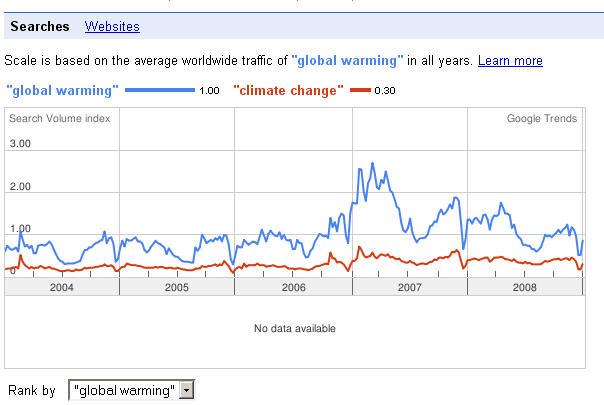Is it more appropriate to use the term “global warming” or “climate change”?
Of course, like anything, it’s complicated. For a bit of history lesson on the terms there is a great post on the NASA Global Climate Chage blog.
To break their very detailed explanation down a little:
1970: referred to as “inadvertent climate modification.”
UPDATE: an astute reader just pointed out that the term “global warming” was actually used first in a 1973 movie called Soylent Green.
1975: the first reference to the term “global warming.” A 1975 article by by geochemist Wallace Broecker appeared in the journal Science titled: “Climatic Change: Are We on the Brink of a Pronounced Global Warming?”
1979: a National Academy of Science study abandons the use of the term “inadvertent climate modification.”
1980’s: the term “global change” began to be used.
1988: “global warming” is popularized by NASA scientist Dr. James Hansen. According to NASA, it was the highly publicized Congressional testimony of Dr. James Hansen in 1988 in which he stated that, “”global warming has reached a level such that we can ascribe with a high degree of confidence a cause and effect relationship between the greenhouse effect and the observed warming,” that saw the term “global warming” become a popular reference in the mainstream media.
Today most scientists use the term “global warming” when referring to surface temperature increases, while “climate change” is is used when referring to everything else that contrinutes to the increases in greenhouse gas emissions and all other effects.
So there you go.
While these are the technical uses of the terms there is an argument made that “global warming” should be used instead of “climate change” when writing in the popular media, especially online. This is because the term “global warming” is searched out on Google millions times more a month than the term “climate change.” The argument goes, if you want to increase the number of people reading your material you should use the lexicon that will most increase your chances of appearing in the search engines.
For example, here’s a screenshot from Google trends showing the search volume for the term “global warming” compared to “climate change” since 2003:
(Click to enlarge)
So the question is: When writing or commenting online do you use the technically correct term or the one that will likely garner you the most visits? Ask a public opinion researcher and they’ll say use “global warming” all the time. Ask a scientist or policy wonk and they’ll no doubt recommend the appropriate technical use.
I tend towards using the term global warming. But I am torn between being technically correct and getting the most eye-balls on a story.
So what do you think the answer is?
This month we’re giving away FREE copies Coming Clean: Breaking America’s Addiction to Oil and Coal.
Go here to find out more details about DeSmogBlog’s monthly book give-away.
Subscribe to our newsletter
Stay up to date with DeSmog news and alerts







